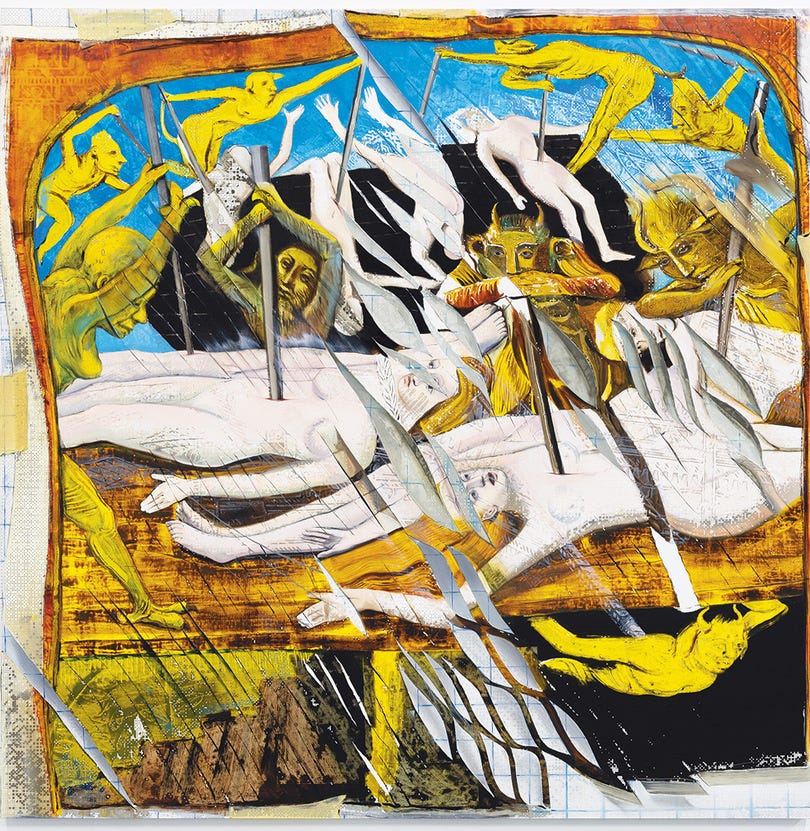Cormac McCarthy
Hello everyone:
Cormac McCarthy, one of our greatest authors passed away on June 13, 2023, at age eighty-nine. Encomiums appeared on practically every social media platform as well as in journals and newspapers.
From the vast outpouring of pieces noting his contribution to American letters I’ve gathered several I think worth reading if you are as big a fan (such a funny word) of McCarthy as I am. Each piece below offers a slightly different perspective on his work and many of them provide outstanding quotes from his novels that may make you want to reread the work from which it was taken, or pick up one of novels you haven’t read. I’ve also included his last filmed interview and an early work of fiction.
Hope you find below useful. Thanks for reading.
This 1992 interview (in some ways a mini biographical portrait) in the NYT by Richard B. Woodward has been widely used by journalists and critics for background material on McCarthy’s life. It has many quotes ‘from the horse’s mouth’ and is well worth reading: https://www.nytimes.com/1992/04/19/magazine/cormac-mccarthy-s-venomous-fiction.html?smid=tw-share
This short review in the New Republic notes: McCarthy’s passages—and his sentences, sometimes—merged the ordinary and the sublime: https://newrepublic.com/post/173605/cormac-mccarthy-one-americas-greatest-novelists-died
The critic Christian Lorentzen provides an incisive overview of McCarthy’s work and situates him in the American literary tradition: https://www.ft.com/content/9120c16b-5aaf-4ce7-ad6e-843bba55da83
Author, novelist, and an associate professor of English at University of North Carolina Charlotte, Aaron Gwyn, who knows as much about McCarthy as anyone (and also has a Substack devoted to McCarthy: bloodmeridian.substack.com) provides a thoughful appreciation: https://thespectator.com/book-and-art/cormac-mccarthy-death-works-alive/
A broad overview of McCarthy’s life and work: https://www.theguardian.com/books/2023/jun/13/cormac-mccarthy-dead-novelist
AO Scott, writing in the NYT, provides historical perspective, shying away from claiming that “the 1930s constitute a literary greatest generation” but name checking more than a half-dozen authors: Toni Morrison (1931); Updike (1932); Susan Sontag, Philip Roth and McCarthy (all 1933), Joan Didion (1934) Don DeLillo (1936), Thomas Pynchon (1937), all of whom, he says “hewed to no school or movement. Without coordination, and with tenacious idiosyncrasy, they redrew the boundaries of the literary mainstream.” https://www.nytimes.com/2023/06/14/books/review/cormac-mccarthy.html?smtyp=cur&smid=tw-nytbooks
An overview and commentary with notes from reviewers of all the films made based on McCarthy’s novels—and there are a surprising number of them: (All the Pretty Horses, No Country for Old Men, The Sunset Limited [original screenplay HBO], The Road, Child of God, The Counselor [original screenplay], The Gardener’s Son [original screenplay PBS series]: https://www.criterion.com/current/posts/8176-cormac-mccarthy-the-films
A compilation of the first reviews of all of McCarthry’s novels: https://bookmarks.reviews/the-first-reviews-of-every-cormac-mccarthy-novel/
The NYT list of McCarthy’s seven “best” books: https://www.nytimes.com/2023/06/13/books/cormac-mccarthy-best-books.html
A review of McCarthy’s last two novels, Stella Maris and The Passenger, by the novelist Joy Williams, who notes: “McCarthy is not interested in the psychology of character. He probably never has been. He’s interested in the horror of every living creature’s situation.” https://harpers.org/archive/2023/01/joy-williams-on-cormac-mccarthy-the-passenger-stella-maris/
This piece focuses on McCarthy’s final two novels but there is plenty of background and coverage of his other works: https://www.theatlantic.com/magazine/archive/2023/01/cormac-mccarthy-the-passenger-stella-maris-book-review/672234/
An early piece of fiction by McCarthy “Bounty” from 1965: https://yalereview.org/article/cormac-mccarthy-story-bounty
Cormac McCarthy’s last interview, conducted at his house in Santa Fe, New Mexico, where McCarthy moved to be near the Santa Fe Institute, a science think tank that Cormac’s friend, the Nobel Prize winning physicist Murray Gell Mann had helped establish. This interview was conducted by Cormac’s long-time friend Lawrence M. Krauss, a theoretical physicist.
PS: I haven’t published much here (or anywhere) recently, but things are in the works. I have an essay that examines the most recent novels of the Nobel Prize winning French author Patrick Modiano which will be out shortly in a new journal, Serpent Club. A review of the cultural significance of Matt Gasda’s Dimes Square will come out in early September (it also includes reviews of some of his other plays). I am also working on an essay on evil in literature that will include the work of McCarthy, Conrad, James, Mann and others. This on top of continuing to refine and revise my novel Deviants. Onto the third draft at this point. It’s looking good, if I do say so myself. I am going to try to post here more frequently. We’ll see how that goes.



